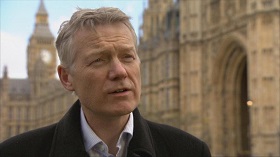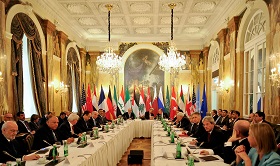Recent developments both in Ukraine and Syria show that international community is making effort to come to terms with Russia on these two stumbling blocks but there is still a lot to be done. European Leadership Network Director Ian Kearns has shared his expert opinion on how these issues might develop in future with RIAC.
Recent developments both in Ukraine and Syria show that international community is making effort to come to terms with Russia on these two stumbling blocks but there is still a lot to be done. European Leadership Network Director Ian Kearns has shared his expert opinion on how these issues might develop in future with RIAC.
What has been achieved according to the OSCE mandate in Ukraine?
I think one of the most important things that have been achieved at this particular moment in time appears to be ceasefire which is functioning and which is being monitored at least to some degree on the ground. Most people still have question marks and problems over the extent to which things can be effectively monitored. But still the fact that we have seen some reduction in the level of fighting and the fact that following the recent meeting of the Normandy group in Paris the number of monitors on the ground in Ukraine from the OSCE appears to be increased shows that these are worthwhile developments. There are still problems with reaching a full ceasefire, withdrawing weapons of small caliber and heavier weapons and having that process monitored. There are still significant problems ahead in terms of the internal politics and reforms inside Ukraine which are required, all of which are part of the Minsk arrangements. It’s far too early to say whether we are on a trajectory which will lead to Ukrainian conflict being resolved but nonetheless I think the achievements over recent months diplomatically and in terms of implementation of the ground should be welcomed and all external parties should do what they can to help solidify that progress and further develop it.
If compared to other missions, how big is this operation?
The whole OSCE mission in Ukraine is certainly the biggest that the OSCE has mounted for many years. In budgetary terms it is spending a very substantial portion of OSCE finances. As a consequence it has had a very steep learning curve for those involved in the OSCE. The building of a special monitoring mission, for example, has been extremely challenging. It required all kinds of technical innovations from acquisition of satellite imagery of the OSCE to allow verification on the ground to monitoring of weapons facilities using fixed cameras, setting up of forward-operating basis. It has therefore been a very significant challenge for the OSCE but one in which, I think, significant progress has been made. It seems to me that there is a potential, if the politics allow, for the OSCE to demonstrate that they have the capability to develop search instruments for implementing peace agreements on a scale which could actually help not just Europe but also the wider international community to figure out how one does these kinds of operations on the ground.
What do you think will happen to the concept “Europe from Lisbon to Vladivostok”?
I think in the longer term the concept of a Europe from Lisbon to Vladivostok will either be rehabilitated as part of an improvement in relations between Russia and the West because in my analysis Russia needs the rest of Europe for economic interactivity, capital investment, specific technology investments in Russia. Europe needs a positive relationship with Russia both for economic reasons, energy supply but also for peace and stability reasons. Russia is too big and important a country to be left outside of the framework of European relations, so I think that at some stage in the future relations should and will improve, and the Lisbon to Vladivostok agenda may therefore be rehabilitated as part of that process. The second reason why changes may impact on the whole Lisbon to Vladivostok agenda is that the Chinese drive to build Silk Road through Central Asia to Europe and partly through Russia to the rest of Europe has the potential to change the whole perception of Lisbon-Vladivostok agenda. In future we may be looking at a space not only from Lisbon to Vladivostok, but from Lisbon and Moscow to Shanghai. In the context of a changing geoeconomic landscape Lisbon to Vladivostok could either survive and thrive as part of bigger picture or it could be become subsumed into a much bigger story of the economic integration of the Eurasian landmass.
In the view of recent dramatic events in Syria and especially if we look at the news headlines, don’t you think that Ukraine is overshadowed by Syrian crisis?
The international media has a limited capacity to shine a spotlight on multiple events at the same time. The international media may have moved the spotlight onto Syria for understandable reasons, given the suffering there and the scale of migration flows to Europe. I recognize that European political leaders for the time being are spending more time dealing with the refugee crisis and with the Syrian crisis diplomacy, spending more time on that than they are on Ukraine. However, it would be a mistake to believe that Ukraine will reduce in its importance on the international stage and in particular that it will be less important to the Russia – West relationship. There may well be people who wish that Ukraine would become less important to Russia – West relationship and that, seeking cooperation, if it’s possible, on challenges like Syria might make the Ukraine problem go away. It would be a misguided view, and until and unless we come to some understanding about how to resolve the Ukrainian crisis in the heart of Europe there will a big problem in Russia – West relations, and it will not reduce an importance. It will be a barrier to improved relations both on the short and the longer term.
As ELN director, do you feel that you had to change a lot in terms of your work given the deteriorating nature of Russia – West relations?
I don’t believe that I have had to change the work fundamentally. The substance of the engagement is different to what it would have been had relations been in a better place. But the founding principle of the work is a commitment to dialogue, and that dialogue needs to happen between actors who don’t see the world in the same way and who may have different interests but who also may have some common interests which need to be uncovered, developed and promoted. My belief in focusing on dialogue is that one engages in dialogue with Russia in particular with a view to understanding how Russia sees the world, its own place in it, with a view to thinking about how best to influence Russia in partnership and in cooperation. You don’t just engage in dialogue with people you like or with people you agree with. You engage in dialogue with those you need to have dialogues with because they are significant actors and because you need to improve an understanding and find a way to reduce tension and confrontation. So in other sense I remain committed to the agenda that we’ve been pursuing for the last few years and whilst some of the specific content of that might be impacted by the day-to-day politics the underlying commitment to a productive dialogue in Russian and Western interests remain at the heart of what I do with the ELN.
How do you assess the work of the coalition that has been working in Syria for the last month?
There is a very considerable concern in Europe and in the West about precisely what Russia is doing in Syria, a lot of concern about the fact that Russian aircraft seems to be attacking not ISIL positions but the positions of any and every opponent of president Assad, with a view to strengthening his position on the ground. Now I think that in the West there is too much focus on believing that president Putin or the Russian leadership are just playing a geopolitical game and trying to strengthen Russian influence in an important theater in the world. There’s too little understanding in the West of what some genuine Russian domestic security concerns about terrorism, Islamist threat, the possibility that the 2000 plus Russian citizens probably fighting for ISIL in Syria and Iraq might return home one day and commit terrorist acts in Russia. All of that needs to be better explained by the Russian leadership and that many people in the West need to understand. Until and unless we get Russia – US and other US-led coalition forces share intelligence about where they think ISIL forces are on the ground and coordinate attacks against ISIL, it’s too soon and fundamentally inaccurate to talk about a coalition against terrorism in Syria which includes Russia, the United States and many other Western actors.
Interviewed by Maria Gurova, RIAC web editor





